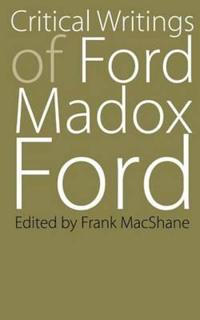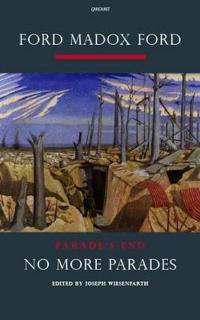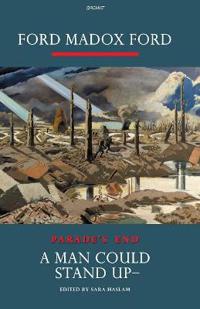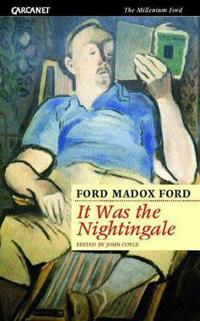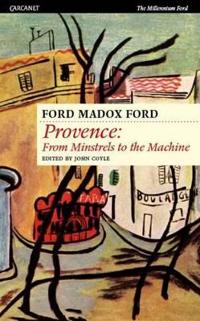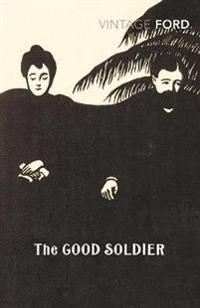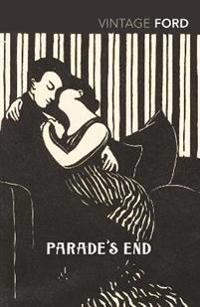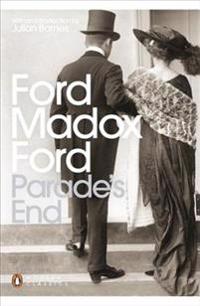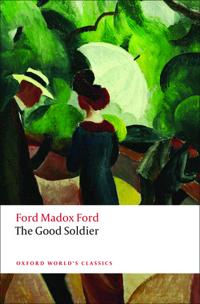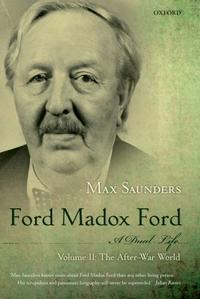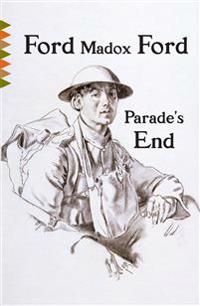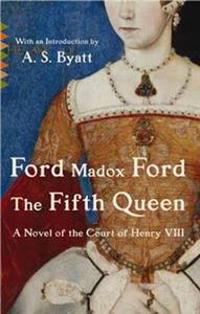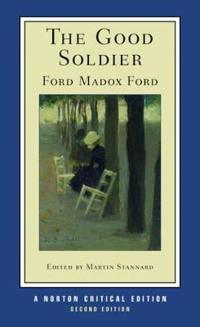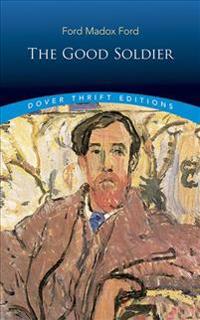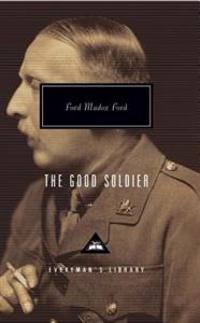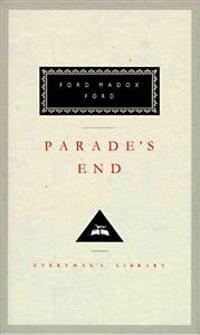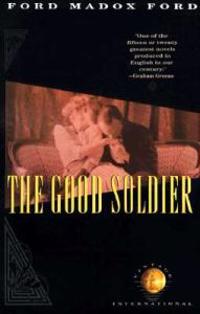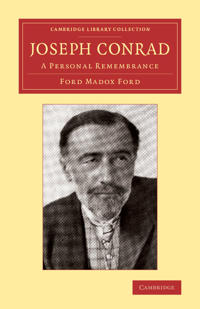Critical Writings of Ford Madox Ford (Häftad)
avFord Madox Ford
ISBN: 9780803254541 - UTGIVEN: 1964-01Novelist, poet, literary critic, editor, a founding father of English Modernism, and one of the most significant novelists of the twentieth century, Ford Madox Ford (1873-1939) was the author of over eighty books, editor of "The English Review" and "The Transatlantic Review", and collaborator with J[...]
The Good Soldier (Pocket)
avFord, Ford Madox
ISBN: 9781604596991Set just before World War I, The Good Soldier chronicles the tragedies of the lives of two seemingly perfect couples. The novel is told using a series of flashbacks, it also makes use of the device of the unreliable narrator as the main character gradually reveals a version of events that is quite d[...]
Parade's End (Pocket)
avFord, Ford Madox
ISBN: 9781847770158 - UTGIVEN: 2011-07-28The final volume of Ford Madox Ford's Parade's End tetralogy.
Parade's End (Inbunden)
avFord, Ford Madox
ISBN: 9781857151145 - UTGIVEN: 1992-11-26A story which traces the history of a house and a family at the time of World War I. This is a picture of Edwardian England at its most opulent. Exploring the themes of love, honour and betrayal, this contemporary of Henry James and Joseph Conrad shows himself their equal in literary skill.[...]
No More Parades (Pocket)
avFord Madox Ford, Joseph (EDT) Wiesenfarth, Ford Madox Ford
ISBN: 9781847770134 - UTGIVEN: 2011-02For the first time, the four novels that make up Ford Madox Ford's First World War masterpiece Parade's End are published in fully annotated editions, with authoritative corrected texts. Each novel is edited by a leading Ford expert. No More Parades includes *the first reliable text, based on the m[...]
A Man Could Stand Up (Pocket)
avFord Madox Ford, Sara (EDT) Haslam, Ford Madox Ford
ISBN: 9781847770141 - UTGIVEN: 2011-07"A Man Could Stand Up", the third volume of "Parade's End", brings Ford's characters to the 'crack across the table of History', across which lie their uncertain post-war futures. Divided into three parts, the novel is a kaleidoscopic vision of society at a climactic moment. The Armistice Day firewo[...]
It Was the Nightingale (Pocket)
avFord Madox Ford, John (INT) Coyle, Ford Madox Ford
ISBN: 9781857549324 - UTGIVEN: 2007-12During a Christmas leave in London, Ford Madox Ford attended a party at the French Embassy, 'a heavy blond man in a faded uniform', wearied by years of war, recalled to a longing for the life of a writer. The evening marks the beginning of a new phase of Ford's life, the years of "It Was the Nightin[...]
Provence (Pocket)
avFord Madox Ford, John (EDT) Coyle, Ford Madox Ford
ISBN: 9781857549898 - UTGIVEN: 2009-07Try then to figure for yourself blood-red cliffs in to which a blue, shining mirror should have introduced itself for miles - the multicoloured boats grouped at the landing, the incredible blue of the sky, the incredible whiteness of the light - And a salad in a dish as large as a cart-wheel. And sw[...]
The Good Soldier (Storpocket)
avFord Madox Ford
ISBN: 9780099540670 - UTGIVEN: 201003This title is presented with an introduction by Zoe Heller. When John Dowell and his wife befriend Edward and Leonora Ashburnham they appear to be the perfect couple. He is a distinguished soldier and she is beautiful and intelligent. However, what lies beneath the surface of their marriage is far m[...]
Parade's End (Häftad)
avFord Madox Ford
ISBN: 9780099577065 - UTGIVEN: 2012-08Christopher Tietjens has long loved the beautiful young suffragette Valentine, but the pair are held apart by Christopher's loyalty to his wife Sylvia, and to a set of principles which belong to an old world, and which are about to be swallowed up in the mud and chaos of the Western Front.[...]
Parade's End (Häftad)
avFord Madox Ford
ISBN: 9780141392196 - UTGIVEN: 201208Booker Prize-winner Julian Barnes introduces Ford Madox Ford's masterpiece "Parade's End" - now a major new BBC/HBO TV adaptation - in this reissued "Penguin Modern Classics" edition. Starring Benedict Cumberbatch as Christopher Tietjens, Rebecca Hall as his wife Sylvia and also featuring Rupert Eve[...]
Ford Madox Ford (Häftad)
avMax Saunders
ISBN: 9780192100153 - UTGIVEN: 2012-09Ford Madox Ford wrote some of the best English prose of the twentieth century, mastering and metamorphosing all its major forms: the novel, literary criticism, travel writing, even historical and cultural discourse. He was also an innovative and influential poet, as well as the century's greatest li[...]
The Good Soldier (Häftad)
avFord Madox Ford
ISBN: 9780199585946 - UTGIVEN: 201209'This is the saddest story I have ever heard.' Wealthy American John Dowell describes in a disarmingly casual, compellingly intimate manner how he and his wife Florence meet an English couple in a German spa resort. They become friends over the years and gradually the history of their relationships [...]
Ford Madox Ford: A Dual Life: Volume 1: The World Before the War (Pocket)
avMax Saunders
ISBN: 9780199668342 - UTGIVEN: 2012-09-13Ford Madox Ford a Dual Life (Pocket)
avMax Saunders
ISBN: 9780199668359 - UTGIVEN: 2012-11The second volume of Max Saunders's magisterial biography of Ford Madox Ford takes up the story from Ford's enlistment in the army and departure for France in 1916. Like its predecessor, The After-War World makes full use of previously unpublished and long-lost material. It is the first biography to[...]
Ford Madox Ford And The Misfit Moderns (Inbunden)
avRob Hawkes
ISBN: 9780230301535 - UTGIVEN: 2012-09-18Ford Madox Ford is a major modernist writer, yet many of his works do not conform to our assumptions about modernism. Examining ways in which he, alongside other 'misfit moderns', undermines 'stabilities' we expect from novels and memoirs, this book poses questions about the nature of narrative and [...]
Parade's End (Häftad)
avFord Madox Ford
ISBN: 9780307744203 - UTGIVEN: 201201Ford Madox Ford's masterpiece, a tetralogy set in England during World War I, is widely considered one of the best novels of the twentieth century.
First published as four separate novels ("Some Do Not . . ., No More Parades, A Man Could Stand Up--, and The Last Post) "between 1924 and 1928, "P[...]The Good Soldier (Häftad)
avFord Madox Ford
ISBN: 9780393927924 - UTGIVEN: 201204Again, based on the meticulously edited collation of four manuscripts along with detailed annotation, this edition allows the reader to study thoroughly Ford Madox Ford's 1915 modernist masterpiece. The "Note on the Text" has been significantly updated, "Backgrounds and Contexts" brings together app[...]
The Good Soldier (Pocket)
avFord Madox Ford
ISBN: 9780486419213 - UTGIVEN: 2001-10For nine years, John Dowell and his wife have spent the summer season at a German spa town in the company of the respectable Ashburnhams. Behind the placid exterior of their lives lie the destructive passions of men and women. When Dowell's world breaks apart, he tells his story as intimately as to [...]
Ford Madox Ford (Häftad)
avAlan Judd
ISBN: 9780571256020 - UTGIVEN: 2009-12Ford Madox Ford is best known for two fictional masterpieces: "The Good Soldier" and the Great War tetralogy, "Parade's End". This biography emphasises that Ford was a giver, believing that the preservation and furtherance of artistic talent was his permanent responsibility.[...]
The Good Soldier (Inbunden)
avFord Madox Ford
ISBN: 9780679406655 - UTGIVEN: 199110When John Dowell and his wife befriend Edward and Leonora Ashburnham, they appear to be the perfect couple. He is a distinguished soldier and she is beautiful and intelligent. However, what lies beneath the surface of their marriage is far more sinister and their influence leads John into a tragic d[...]
The Good Soldier: A Tale of Passion (Häftad)
avFord Madox Ford, Mark Schorer
ISBN: 9780679722182 - UTGIVEN: 1989-03At the fashionable German spa town Bad Nauheim, two wealthy, fin de siecle couples -- one British, the other American -- meet for their yearly assignation. As their story moves back and forth in time between 1902 and 1914, the fragile surface propriety of the pre -- World War I society in which thes[...]
Joseph Conrad (Pocket)
avFord Madox Ford
ISBN: 9781108060943 - UTGIVEN: 2013-06Determined not to write a biography about his friend Joseph Conrad (1857-1924) in the usual dry style, Ford Madox Ford (1873-1939) instead produced a novel. Like his fictional narrators, he has an imperfect memory: he places the beginning of their acquaintance several years after they first collabor[...]

